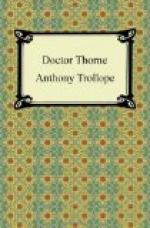THE LAST NEW BARONET
But Mr Moffat hardly escaped on easier terms. The trade by which his father had made his money was as well known as that of the railway contractor; and every possible symbol of tailordom was displayed in graphic portraiture on the walls and hoardings of the city. He was drawn with his goose, his scissors, with his needle, with his tapes; he might be seen measuring, cutting, pressing, carrying home his bundle and presenting his little bill; and under each of these representations was repeated his own motto: ‘England’s honour’.
Such were the pleasant little amenities with which the people of Barchester greeted the two candidates who were desirous of the honour of serving them in Parliament.
The polling went briskly and merrily. There were somewhat above nine hundred registered voters, of whom the greater portion recorded their votes early in the day. At two o’clock, according to Sir Roger’s committee, the numbers were as follows:—
Scatcherd 275 Moffat 268
Whereas, by the light afforded by Mr Moffat’s people, they stood in a slightly different ratio to each other, being written thus:—
Moffat 277 Scatcherd 269
This naturally heightened the excitement, and gave additional delight to the proceedings. At half-past two it was agreed by both sides that Mr Moffat was ahead; the Moffatites claiming a majority of twelve, and the Scatcherdites allowing a majority of one. But by three o’clock sundry good men and true, belonging to the railway interest, had made their way to the booth in spite of the efforts of a band of roughs from Courcy, and Sir Roger was again leading, by ten or a dozen, according to his own showing.
One little transaction which took place in the earlier part of the day deserves to be recorded. There was in Barchester an honest publican—honest as the world of publicans goes—who not only was possessed of a vote, but possessed of a son who was a voter. He was one Reddypalm in earlier days, before he had learned to appreciate the full value of an Englishman’s franchise, he had been a declared Liberal and a friend of Roger Scatcherd’s. In latter days he had governed his political feelings with more decorum, and had not allowed himself to be carried away by such foolish fervour as he had evinced in his youth. On this special occasion, however, his line of conduct was so mysterious as for a while to baffle even those who knew him best.
His house was apparently open in Sir Roger’s interest. Beer, at any rate, was flowing there as elsewhere; and scarlet ribbons going in—not perhaps, in a state of perfect steadiness—came out more unsteady than before. Still had Mr Reddypalm been deaf to the voice of that charmer, Closerstil, though he had charmed with all his wisdom. Mr Reddypalm had stated, first his unwillingness




